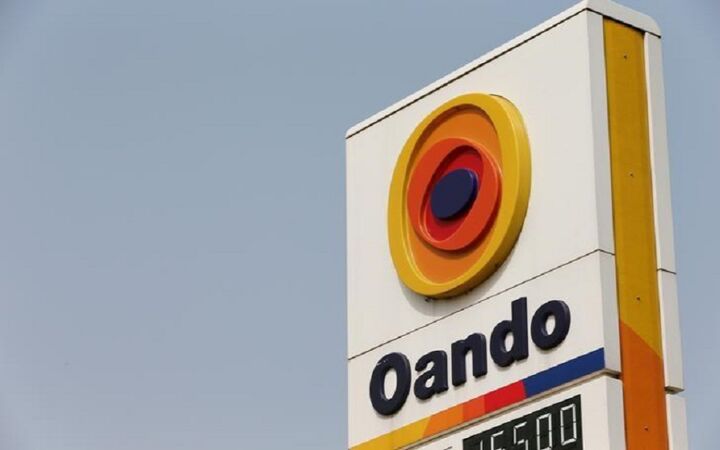Oando Plc, one of Nigeria’s major energy companies, has temporarily suspended petrol importation into the country following the ramp-up of output by Dangote Petroleum Refinery. This move marks a significant shift in the nation’s fuel supply dynamics as domestic refining capacity continues to expand, reducing reliance on foreign imports.
According to industry insiders, Oando’s decision is driven by a combination of market forces, rising local refining activity, and strategic adjustments to the evolving fuel supply chain. The Dangote Refinery, which has intensified production in recent months, now meets a substantial portion of Nigeria’s petrol demand, gradually displacing imported fuel in the domestic market.

Executives close to the matter confirmed that the company has opted to align its operations with the emerging local supply trend. “With Dangote Refinery ramping up output, it makes economic sense for marketers to adjust their import programs. Local refining will soon cover most of the national demand,” a senior Oando official was quoted as saying.
Industry analysts note that this development signals a new phase for Nigeria’s downstream oil sector, which has long been dominated by imports due to the non-functional state of government-owned refineries. The entry of Dangote’s 650,000 barrels per day refinery has altered this dynamic, providing the first credible alternative to foreign fuel sources in decades.
Energy experts believe that Oando’s move could also be strategic, anticipating cost advantages from domestic supply and reduced exposure to foreign exchange volatility. The ongoing instability in Nigeria’s forex market has made fuel importation increasingly expensive for marketers, who often rely on dollars to pay international suppliers.
By turning to local sources, marketers like Oando may gain price stability and improved access to supply, while consumers could benefit from fewer disruptions linked to global oil market fluctuations. However, concerns remain about the refinery’s pricing model, with industry observers urging transparency to ensure competitive pump prices.
The Dangote Refinery, which began refining operations earlier in 2025, has gradually expanded its daily production capacity. Officials familiar with the refinery’s operations say that output has now reached levels sufficient to meet domestic demand for diesel, aviation fuel, and a growing portion of petrol needs. The facility, located in Lekki, Lagos State, continues to attract international attention for its potential to transform Africa’s fuel landscape.
The Nigerian Midstream and Downstream Petroleum Regulatory Authority (NMDPRA) has welcomed the growing reliance on local refining, noting that it aligns with the federal government’s vision to end petrol importation. The Authority’s spokesperson said that increased domestic production would help stabilize prices and enhance energy security. “Nigeria has for too long depended on imported fuel. The development at Dangote Refinery represents a turning point for our energy independence,” the spokesperson noted.
Economists have also highlighted the wider implications of this trend, emphasizing its potential to improve Nigeria’s balance of payments. By reducing import bills, the country can conserve foreign reserves and redirect funds toward domestic infrastructure and manufacturing growth. According to reports, Nigeria spends an estimated $10 billion annually on fuel imports — a figure that could drop sharply as the Dangote Refinery reaches full capacity.
However, some industry players remain cautious about the pace of transition. They warn that supply logistics, regulatory bottlenecks, and distribution challenges could pose short-term hurdles. For now, most marketers are adopting a wait-and-see approach, adjusting supply strategies in line with refinery output and government policies.
The Major Oil Marketers Association of Nigeria (MOMAN) recently indicated that its members are engaging with Dangote Refinery to establish stable supply agreements. The group expressed optimism that the refinery’s increasing production would eventually translate to lower retail prices once full operations and consistent supply are achieved.
Meanwhile, independent marketers have expressed mixed reactions. Some believe local refining will drive efficiency and reduce costs, while others argue that uncertainties over ex-depot pricing could complicate planning. Despite these concerns, the general sentiment within the industry remains positive about the long-term benefits of domestic refining.
For Oando, the suspension of petrol imports marks a pivotal moment in its operational strategy. The company, which has long been a major importer of refined products, appears to be repositioning itself for a future centered on local partnerships and value-added services in the downstream sector.
Financial analysts predict that this shift could boost Oando’s profitability in the medium term, as reduced import dependence shields it from currency shocks and freight-related expenses. Moreover, aligning with Dangote Refinery could allow the company to strengthen its retail network with more predictable supply channels.
The federal government, through the Ministry of Petroleum Resources, has reiterated its commitment to supporting local refiners and marketers in the transition toward self-sufficiency. Officials say the government’s priority is to ensure that the benefits of local refining translate into affordable fuel prices for Nigerians.
As Dangote Refinery continues to scale production, other players in the sector may follow Oando’s lead by cutting back on imports and embracing local sourcing. The coming months will likely define the new equilibrium in Nigeria’s fuel market, with domestic refining poised to replace decades of import dependence.
At present, stakeholders remain optimistic that this shift will not only stabilize the petroleum market but also stimulate broader industrial growth. For consumers, the hope is that consistent local supply will eventually translate to improved availability and fairer pricing, signaling a major milestone in Nigeria’s long pursuit of energy security.
Support InfoStride News' Credible Journalism: Only credible journalism can guarantee a fair, accountable and transparent society, including democracy and government. It involves a lot of efforts and money. We need your support. Click here to Donate
